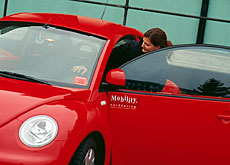Swiss car sharing continues its expansion

For the past two decades, a growing number of Swiss drivers have preferred to share cars with complete strangers rather than actually own a vehicle themselves.
The most successful car-sharing scheme in Switzerland, the Mobility cooperative that boasts over 70,000 members, is celebrating its tenth birthday this month.
Car sharing has developed considerably in Switzerland over the past 20 years ever since the first two car co-ops, AutoTeilet Genossenschaft and ShareCom, were set up with 25 members and two cars in May 1987.
The two “ecological” collectives eventually merged in 1997 to form a more professional outfit, Mobility, which has since gone from strength to strength to become Switzerland and Europe’s biggest carsharing network.
“I have 1,800 cars to choose from instead of just one,” explains regular customer Oskar von Arb. “But I never have to clean them or worry about insurance, a service or changing the tires.”
Mobility members pay an annual flat fee. They then simply reserve the vehicle – by phone or internet – and pay for their precise usage (exact distance and time) by monthly bill.
Von Arb squeezes out of the tiny, bright red Smart that he has just parked on the specially marked space at Bern station. He has just travelled ten kilometres from his home in Kirchlindach to the centre of the Swiss capital.
“I joined the scheme in 2000 after my old car broke down. It was cheaper and I wanted to drive less,” said von Arb, admitting that he especially wanted to avoid “useless car trips” to buy cigarettes.
Cost-cutting
Von Arb still likes to drive, but his behaviour has changed, becoming more cost-conscious.
“Every time I ask myself if I really need to use the car? Even if someone is not ecologically-minded, they generally tend to think in terms of how much it costs,” he added.
Von Arb now covers a quarter of the 10,000 to 12,000 kilometres he used to drive every year. But he doesn’t feel that it restricts him.
“I spend my holidays in Switzerland but I don’t have to take my car as they are parked all over the country,” he said.
But it’s a real pain, he explains, that the car has to be returned to the place it was originally picked up from.
Flexible transport
With his annual travel pass, which allows him unlimited travel on Swiss railways, post buses, lake and riverboats, and on trams and buses in many cities, von Arb is a typical car sharer.
Switzerland’s reliable and efficient public transport, which provides maximum flexibility, has been an effective way of persuading drivers to switch to pooled cars.
“It’s only thanks to the dense transport network that we can use our vehicles much less,” explains Karl Heusi, Mobility’s managing director.
And the environmental impact of using this combination of transport is also measurable.
According to a 2006 study by the Federal Energy Office, every car-sharing customer avoids producing around 200 kilogrammes of carbon dioxide (CO2) per year. In total pooled car users saved some 11,000 tons of CO2 in 2005.
Growth
Membership growth has levelled off in recent years, mainly due to an increase in cancelled subscriptions. The most frequent reason being an increase or decrease in the household’s need for mobility by car.
Besides that, passive members in particular are cancelling their subscriptions in reaction to an increase in the annual subscription fee.
Some customers have also complained of problems with billing and have voiced concerns about the cleanliness of vehicles. Potential users can also be put off by what they see as a complicated system.
The head of the car co-op remains however very happy with company growth – a ten per cent membership increase in 2006 – but doesn’t want it to rest on its laurels.
“There is still great potential [for growth], as many people are not aware of the offer,” added Heusi.
The company is aiming to have a Mobility car available on every street corner and in some big cities this is already the case. It also hopes to expand its offer internationally, which is “imminent”, according to the cooperative’s executive president, Giatgen Peder Fontana.
swissinfo, based on a German article by Renat Künzi
Car sharing (or car clubs) is a system where a fleet of cars (or other vehicles) is jointly owned by the users who are organised as a democratically controlled company, public agency, cooperative or ad-hoc grouping.
Carpooling, or ride-sharing, is the shared use of a car, in particular for commuting to work, often by people who each have a car but travel together to save costs.
Switzerland is a leader in car sharing, although in absolute figures there are currently more organisations, users and vehicles in Germany.
The first Swiss car-sharing collectives were AutoTeilet Genossenschaft and ShareCom, which both started “ecological” associations independently in May 1987.
Both organisations merged in 1997 to form the professional co-operative Mobility, which started with 760 cars and 17,000 members and has since grown to become the biggest car-sharing company in Europe with 1,850 cars, 71,300 members and 1,000 pick-up points.
The average private Mobility customer takes 16 to 17 trips per year, with an average distance of 42 kilometres per trip – a total of less than 500 kilometres.
Mobility had a turnover of SFr45.5 million ($37.5 million) in 2006. The company has 147 employees.

In compliance with the JTI standards
More: SWI swissinfo.ch certified by the Journalism Trust Initiative



You can find an overview of ongoing debates with our journalists here. Please join us!
If you want to start a conversation about a topic raised in this article or want to report factual errors, email us at english@swissinfo.ch.